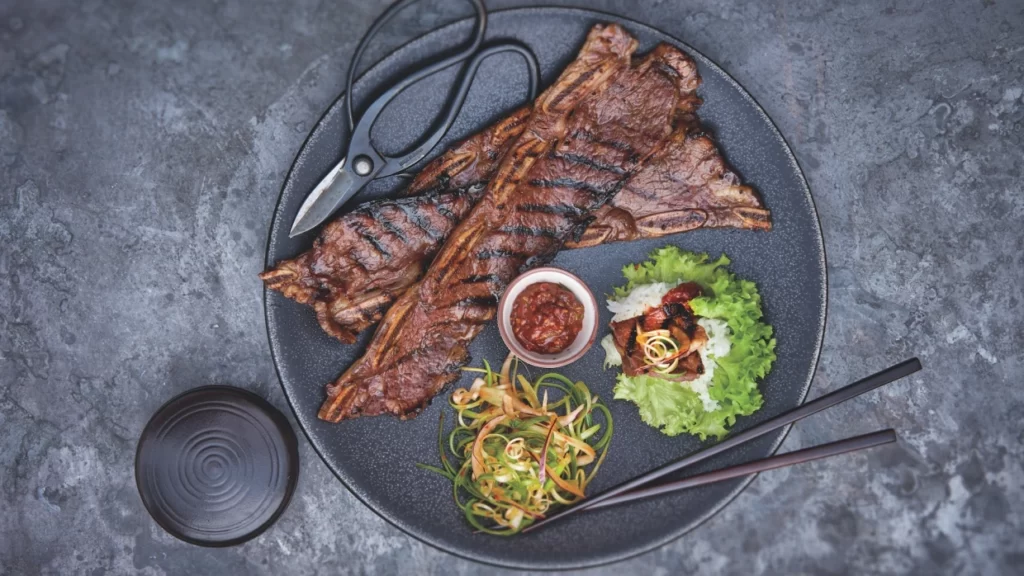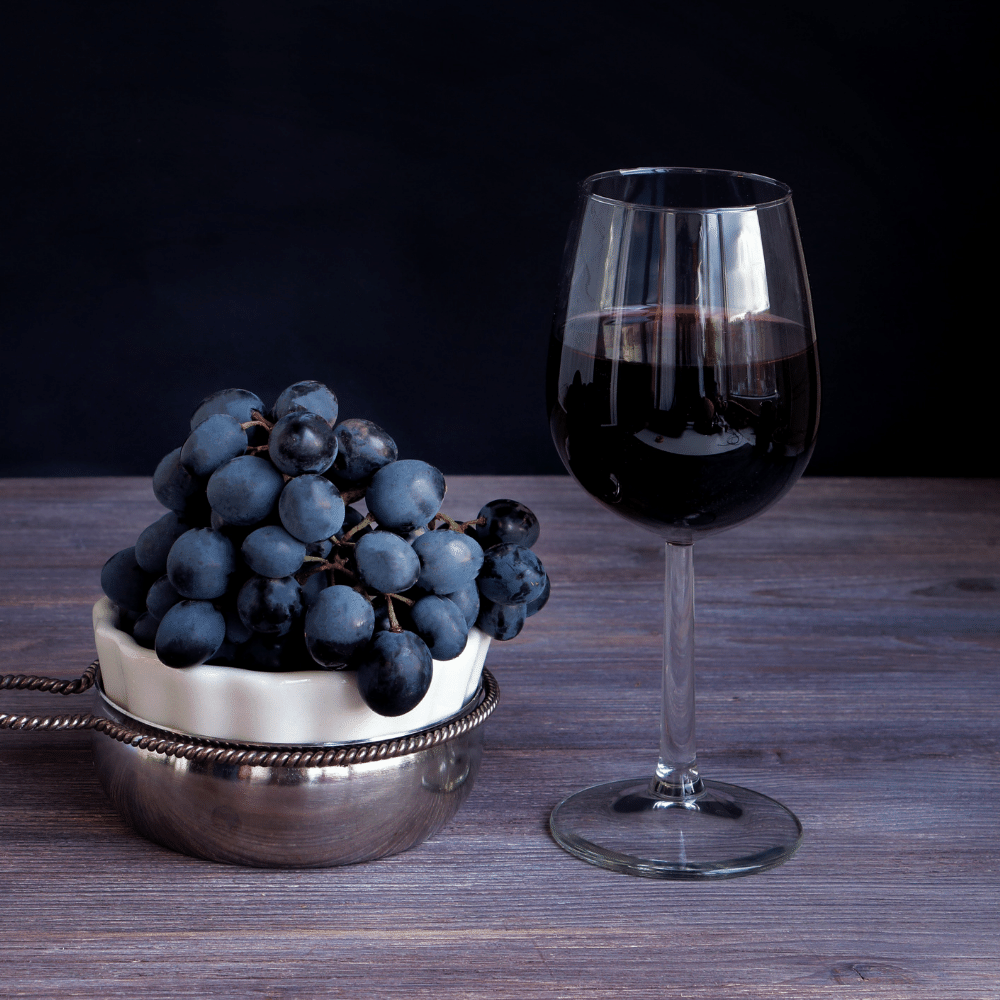Welcome to the world of Korean BBQ wine pairing!
As wine enthusiasts, we believe that there is always a perfect wine to complement any dish, and Korean BBQ is no exception.
With its unique blend of sweet, savory, and spicy flavors, Korean BBQ can be a challenge to pair with wine.
However, when done right, the combination of Korean BBQ and wine can be a match made in heaven.
So, what wine goes with Korean BBQ?
The best wines to pair with Korean BBQ are fruity and medium-bodied, such as Shiraz, Chianti, Zinfandel, or Sangiovese. These wines have enough body to stand up to the bold flavors in Korean dishes while still being light enough not to overpower the dish.
In this article, we will guide you through the best wines for Korean BBQ.
From the perfect reds to refreshing whites and delightful rosés, we have got you covered.
We will also share some creative ideas on how to serve your wine with your Korean BBQ meals and provide tips on serving temperature and glassware.
So, if you want to elevate your Korean BBQ experience to the next level, read on to discover the ultimate Korean BBQ wine pairing guide.

Why Consider Serving Wine With Korean BBQ?
When it comes to pairing wine with food, the traditional approach has been to match the wine with the main protein or flavor of the dish.
However, with the rise of fusion cuisine and multicultural dining experiences, the rules of wine pairing have evolved.
Korean BBQ, in particular, offers a complex blend of flavors and textures, making it an exciting challenge for wine pairing.
While beer and soju have been the traditional choices for pairing with Korean BBQ, wine can offer a unique and elegant option that can enhance the dining experience.
Here are some reasons why you should consider serving wine with your Korean BBQ:
- Wine can complement the flavors of Korean BBQ: Korean BBQ typically includes marinated meats, such as bulgogi and galbi, which have a sweet and savory flavor profile. The acidity and tannins in wine can help to balance out the richness of the meat, while also highlighting the sweetness of the marinade.
- Wine can enhance the dining experience: Drinking wine is a sensory experience that can heighten the overall enjoyment of the meal. The aroma and flavor of the wine can interact with the flavors of the food, creating a new and exciting taste sensation.
- Wine can offer a sophisticated alternative to beer and soju: While beer and soju are popular beverage choices for Korean BBQ, wine can offer a more upscale and elegant option. It can also provide a conversation starter or a way to impress guests with your wine knowledge.
The Best Red Wines

When it comes to pairing red wine with Korean BBQ, it’s important to choose a wine with plenty of body and tannins that can stand up to the bold and savory flavors of the meat.
Here are some of the best red wines to consider:
- Cabernet Sauvignon: Cabernet Sauvignon is a classic choice for pairing with red meat, and Korean BBQ is no exception. The wine’s bold tannins and flavors of blackcurrant and cedar can complement the richness of beef dishes like bulgogi and galbi.
- Syrah: Syrah, also known as Shiraz, is another full-bodied red wine that can pair well with Korean BBQ. The wine’s flavors of dark fruit and spice can complement the bold flavors of the meat, while its tannins can help to balance out the richness.
- Malbec: Malbec is a medium to full-bodied red wine that can pair well with both beef and pork dishes. The wine’s flavors of blackberry and plum can complement the sweetness of the marinades, while its tannins can help to balance out the rich and fatty flavors of the meat.
- Pinot Noir: While Pinot Noir is typically a lighter-bodied red wine, it can still be a good choice for pairing with Korean BBQ. The wine’s higher acidity and flavors of cherry and cranberry can help to cut through the richness of pork dishes like samgyupsal.
When serving red wine with Korean BBQ, it’s important to serve it at the right temperature. Red wine should be served slightly cooler than room temperature, between 60-65 degrees Fahrenheit.
It’s also recommended to use a large, wide-mouthed glass that allows for plenty of oxygenation and aeration.
The Best White Wines

While red wine is a popular choice for pairing with Korean BBQ, white wine can also be a great option, especially for those who prefer a lighter and more refreshing wine.
Here are some of the best white wines to consider:
- Riesling: Riesling is a versatile white wine that can pair well with a variety of Korean BBQ dishes. The wine’s natural sweetness can complement the sweetness of the marinades, while its high acidity can help to cut through the richness of the meat.
- Gewürztraminer: Gewürztraminer is another white wine that can pair well with Korean BBQ. The wine’s floral and spicy flavors can complement the bold flavors of the meat, while its sweetness can help to balance out the spiciness of the dish.
- Chardonnay: While Chardonnay is typically a heavier white wine, it can still be a good choice for pairing with rich and savory Korean BBQ dishes like beef bulgogi. Look for unoaked Chardonnays that are crisp and refreshing, rather than heavy and buttery.
- Pinot Grigio: Pinot Grigio is a light-bodied white wine that can pair well with lighter Korean BBQ dishes like chicken or seafood. The wine’s refreshing acidity and citrus flavors can help to enhance the delicate flavors of the meat.
The Best Rosé Wines

Rosé wines can be a versatile and refreshing option for pairing with Korean BBQ.
Here are some of the best rosé wines to consider:
- Grenache Rosé: Grenache is a light-bodied red grape that is often used to make rosé wines. These wines can have a fruity and refreshing flavor profile that can complement a variety of Korean BBQ dishes.
- Pinot Noir Rosé: Pinot Noir is another red grape that can be used to make refreshing and delicate rosé wines. These wines can have flavors of strawberry and raspberry that can complement the sweet and savory flavors of Korean BBQ.
- Sangria: While not technically a rosé wine, Sangria can be a fun and festive option for pairing with Korean BBQ. This fruity and refreshing drink can complement the bold and spicy flavors of the meat, while also providing a fun and festive atmosphere.
Other Wines To Pair With Korean BBQ Meals
In addition to the traditional reds, whites, and rosés, there are other types of wine that can pair well with Korean BBQ. Here are some other wines to consider:
- Sparkling Wine: Sparkling wine can be a refreshing and fun option for pairing with Korean BBQ. Its effervescence can help to cut through the richness of the meat, while its refreshing flavors can complement a variety of Korean BBQ dishes.
- Beaujolais: Beaujolais is a light-bodied red wine that can be a good choice for those who prefer a lighter wine. The wine’s fruity and floral flavors can complement the sweet and savory flavors of Korean BBQ.
- Soju: Soju is a traditional Korean alcohol that is made from rice, wheat, or barley. It can be a fun and unique option for pairing with Korean BBQ, especially when served in a cocktail with fresh fruit or herbs.
Serving Temperature And Glassware
When serving wine with Korean BBQ, it’s important to pay attention to the temperature of the wine and the type of glassware you use.
Here are two tips for serving temperature and glassware:
- Serving Temperature: The temperature at which you serve your wine can greatly affect its flavor and aroma. Red wine should be served slightly cooler than room temperature, between 60-65 degrees Fahrenheit. White wine should be served chilled, between 45-50 degrees Fahrenheit. Rosé wine should also be served chilled, between 45-50 degrees Fahrenheit. Sparkling wine should be served very cold, between 35-45 degrees Fahrenheit.
- Glassware: The type of glassware you use can also affect the flavor and aroma of your wine. Red wine should be served in a large, wide-mouthed glass that allows for plenty of oxygenation and aeration. This can help to bring out the wine’s full flavor profile. White wine should be served in a smaller, narrower glass that can help to focus the aromas and flavors of the wine. Rosé wine can be served in either a red wine glass or a white wine glass, depending on your preference. Sparkling wine should be served in a flute or tulip-shaped glass that can help to capture the wine’s bubbles and aroma.
Conclusion
In conclusion, pairing wine with Korean BBQ is an exciting and delicious way to enhance your dining experience. The rich and savory flavors of Korean BBQ can be beautifully complemented by the right wine, whether it’s a bold and tannic red, a refreshing and sweet white, or a light and fruity rosé.
With the right pairing, wine can elevate the taste and enjoyment of the meal, providing a sophisticated alternative to traditional beverage choices like beer and soju.
So, what wine pairs well with Korean BBQ?
The best wines to pair with Korean BBQ are fruity reds like Shiraz, Zinfandel, or Chianti. These robust and flavorful wines will stand up to the bold spices of Korean cuisine. A lighter white such as Riesling can also work well if you prefer a crisp flavor profile.
When pairing wine with Korean BBQ, it’s important to consider the flavors, spiciness, and textures of the dish, as well as the body and tannins of the wine.
By following the tips we’ve discussed, including serving temperature and glassware, you can create a truly memorable Korean BBQ and wine pairing experience that will delight your taste buds and impress your guests.
So whether you’re hosting a dinner party or simply enjoying a meal at home, don’t be afraid to experiment with different wine and food combinations.
With a little bit of knowledge and creativity, you can create a unique and delicious Korean BBQ and wine pairing experience that will leave you wanting more.
Jenny has always been passionate about cooking, and she uses her platform to share her joy of food with others. Her recipes are easy to follow, and she loves giving tips and tricks to help others create their own unique culinary creations.

